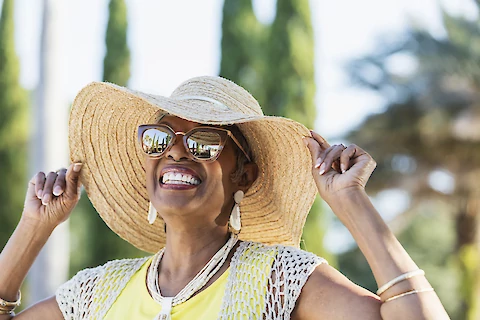
With summer in full swing and the sun shining bright, it's the perfect time to discuss the importance of sun protection for seniors. In this post from Senior Helpers Boston, we'll delve into age-related factors and risks that make sun safety crucial for senior adults. We'll explore the vulnerability of aging skin to sun exposure, medication side effects that can increase sun sensitivity, and the heightened risk of skin cancer development as we age.
Aging Skin and Sun Exposure
As we age, our skin undergoes significant changes, making it more susceptible to damage from sun exposure. One of the primary reasons for this increased vulnerability is the thinning of the skin as we age. With thinner skin, the barrier between harmful UV rays and delicate underlying structures is weakened. It leads to a higher likelihood of sunburn and other sun-related damage. Additionally, the skin's ability to repair itself diminishes over time. This means that even minor damage from the sun can have lasting effects on aging skin.
Medications and Sun Sensitivity
Another factor that seniors should consider when it comes to sun safety is the potential for certain medications to increase sensitivity to sunlight. Common medications, such as antibiotics, diuretics, and antidepressants, can cause photosensitivity. This makes the skin more susceptible to sunburn and other sun-related damage.
If you're taking any of these medications, it's essential to be aware of the potential side effects and take appropriate precautions when spending time outdoors.
Practical Tips for Sun Safety
The risks associated with sun exposure can be concerning. There are practical steps that seniors can take to protect their skin while still enjoying outdoor activities:
- Wearing sunscreen with a high SPF value. It's crucial to choose a broad-spectrum sunscreen with an SPF of at least 30, which will protect against both UVA and UVB rays. Make sure to apply sunscreen liberally and reapply every two hours or after swimming or sweating.
- Protective clothing and hats. When spending time outdoors, opt for clothing with a high UPF (Ultraviolet Protection Factor) rating. This indicates how effectively the fabric blocks UV rays. Wearing a wide-brimmed hat is also an excellent way to shield your face and neck from harmful sun exposure.
- Seeking shade when possible. While spending time outside, try to position yourself in shaded areas or make use of umbrellas and other shade structures. Selecting outdoor activities that take place in shaded areas can also help reduce sun exposure. These include nature walks or picnics beneath trees.
Get Support and Sun Safety Tips From Senior Helpers
Sun safety is an essential aspect of overall health and well-being for seniors. By taking the time to protect your skin from sun exposure, you can significantly reduce the risk of sun-related damage and skin cancer while still enjoying the great outdoors.
If you or a loved one are living in Boston, Cambridge, Waltham, Watertown, Mattapan, West Roxbury, Hyde Park, or Norwood and need assistance with daily activities or companionship, Senior Helpers Boston is here to help. Contact us today to learn more about our services and how we can support you in maintaining a healthy and active lifestyle.